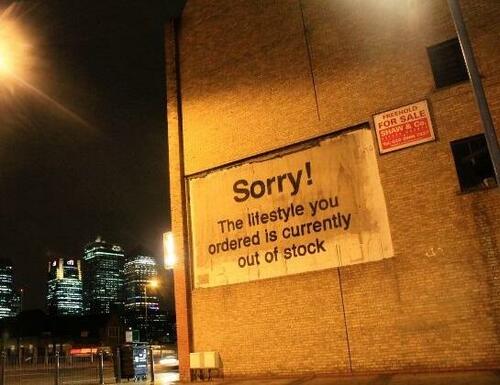
Authored by Charles Hugh Smith via OfTwoMinds blog,
The gag reflex kicks in at some point and we walk away because it is no longer worth the price.
Everyone has a line in the sand when it comes to inflated prices they refuse to pay. For one Walmart shopper I observed, it was a carton of eggs for close to $10. She announced her line in the sand verbally, with great force and sincerity.
What's your line in the sand, the point at which you simply refuse to pay the asking price? Is it the $25 burger? Or is it the $50 for two burritos and two beverages?
Each person's line in the sand reflects their income, wealth, budget, social status and value system--what's important to them. For some higher income folks, it might be the ridiculous "resort fee" that's tacked onto the already overpriced resort room, hotel tax, excise tax, parking fees and the extra-special charge for Internet service.
For others, it might be the outrageous estimate for repairing a system failure in a nearly-new vehicle that is (surprise!) no longer covered by the manufacturer's warranty. Hundreds of dollars for what?
How about $25 for a few ounces of specialty coffee beans?
Or is it $38 a pound for chocolate-covered nuts or some other confection?
Is it being stripmined to buy a hot dog and beer at a sporting event, or the "service charge" to buy a grossly overpriced ticket to a concert?
Or is it having to take out a second mortgage to cover the entrance fees to an amusement park?
Maybe it's the shockingly high cost of what used to be dirt-cheap--a camping permit in a state or national park. (When camping becomes an expensive outing, the Revolutionary Clock is getting close to midnight.)
Could it be the absurdly inflated cost of cable TV service, or the total cost of all those subscriptions for marginal content/entertainment spew?
Or perhaps you finally had enough of paying over $5 for a box of cereal that's now so narrow and tall (to mask the shrinking contents) that the box doesn't even stand up on its own? (You can make your own much healthier granola for a fraction of the cost of packaged mostly-air cereals.)
Or maybe it's paying extra to get a seat reservation after you've already bought the airline ticket. (Interesting, isn't it, that buying an airline ticket doesn't necessarily mean you have a seat reservation--that's extra.)
Perhaps it's the rental car fee that not that long ago was $25 a day that's now $100 a day.
How about $2,400 a month for an ugly little flat in a new cookie-cutter apartment complex?
The gag reflex kicks in at some point and we walk away because it is no longer worth the price. Since price is set on the margins of supply and demand, all these lines in the sand will eventually become consequential.
* * *
My new book is now available at a 10% discount ($8.95 ebook, $18 print): Self-Reliance in the 21st Century. Read the first chapter for free (PDF)
Authored by Charles Hugh Smith via OfTwoMinds blog,
The gag reflex kicks in at some point and we walk away because it is no longer worth the price.
Everyone has a line in the sand when it comes to inflated prices they refuse to pay. For one Walmart shopper I observed, it was a carton of eggs for close to $10. She announced her line in the sand verbally, with great force and sincerity.
What’s your line in the sand, the point at which you simply refuse to pay the asking price? Is it the $25 burger? Or is it the $50 for two burritos and two beverages?
Each person’s line in the sand reflects their income, wealth, budget, social status and value system–what’s important to them. For some higher income folks, it might be the ridiculous “resort fee” that’s tacked onto the already overpriced resort room, hotel tax, excise tax, parking fees and the extra-special charge for Internet service.
For others, it might be the outrageous estimate for repairing a system failure in a nearly-new vehicle that is (surprise!) no longer covered by the manufacturer’s warranty. Hundreds of dollars for what?
How about $25 for a few ounces of specialty coffee beans?
Or is it $38 a pound for chocolate-covered nuts or some other confection?
Is it being stripmined to buy a hot dog and beer at a sporting event, or the “service charge” to buy a grossly overpriced ticket to a concert?
Or is it having to take out a second mortgage to cover the entrance fees to an amusement park?
Maybe it’s the shockingly high cost of what used to be dirt-cheap–a camping permit in a state or national park. (When camping becomes an expensive outing, the Revolutionary Clock is getting close to midnight.)
Could it be the absurdly inflated cost of cable TV service, or the total cost of all those subscriptions for marginal content/entertainment spew?
Or perhaps you finally had enough of paying over $5 for a box of cereal that’s now so narrow and tall (to mask the shrinking contents) that the box doesn’t even stand up on its own? (You can make your own much healthier granola for a fraction of the cost of packaged mostly-air cereals.)
Or maybe it’s paying extra to get a seat reservation after you’ve already bought the airline ticket. (Interesting, isn’t it, that buying an airline ticket doesn’t necessarily mean you have a seat reservation–that’s extra.)
Perhaps it’s the rental car fee that not that long ago was $25 a day that’s now $100 a day.
How about $2,400 a month for an ugly little flat in a new cookie-cutter apartment complex?
The gag reflex kicks in at some point and we walk away because it is no longer worth the price. Since price is set on the margins of supply and demand, all these lines in the sand will eventually become consequential.
* * *
My new book is now available at a 10% discount ($8.95 ebook, $18 print): Self-Reliance in the 21st Century. Read the first chapter for free (PDF)
Loading…







